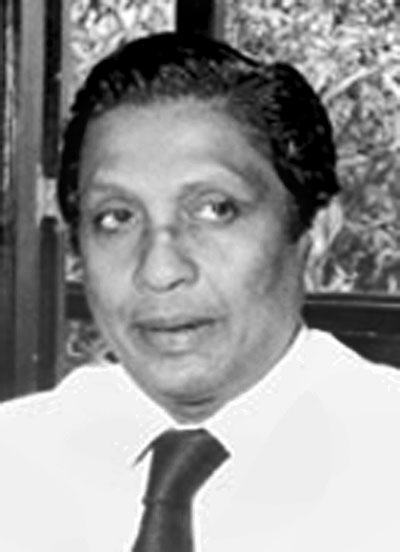Sunday Times 2
Professor Stanley Wijesundera Memorial lecture key feature at 8th Annual Scientific Sessions
View(s):The memorial lecture to commemorate the life and times of Late Prof. Stanley Wijesundera, Vice Chancellor of University of Colombo was held at the Institute of Biochemistry, Molecular Biology & Biotechnology (IBMBB) of the University of Colombo on 27 May 2016. Professor Stanley Wijesundera Memorial lecture was one of the key features in the programme of the 8th Annual Scientific Sessions of the IBMBB, University of Colombo.
 The Inauguration ceremony of the 8thAnnual Scientific Sessions of the IBMBB, University of Colombo commenced with the lighting of the oil lamp by Professor Lakshman Dissanayake, Vice Chancellor University of Colombo, Vidyajyothi Professor Rezvi Sheriff, the Memorial Leturer, Dr Rohan Wijesundera, Shalitha Wijesundera, Lakmini Wijesundera and Professor Shiroma Handunnetti, Director IBMBB, University of Colombo. Vidyajyothi Professor Rezvi Sheriff, Professor of Medicine, General Sir John Kothalawala Defence University was awarded the Memorial lecture medal for 2016 by Prof. Eric Karunanayake, Founder Director of IBMBB.
The Inauguration ceremony of the 8thAnnual Scientific Sessions of the IBMBB, University of Colombo commenced with the lighting of the oil lamp by Professor Lakshman Dissanayake, Vice Chancellor University of Colombo, Vidyajyothi Professor Rezvi Sheriff, the Memorial Leturer, Dr Rohan Wijesundera, Shalitha Wijesundera, Lakmini Wijesundera and Professor Shiroma Handunnetti, Director IBMBB, University of Colombo. Vidyajyothi Professor Rezvi Sheriff, Professor of Medicine, General Sir John Kothalawala Defence University was awarded the Memorial lecture medal for 2016 by Prof. Eric Karunanayake, Founder Director of IBMBB.
The Vice Chancellor, Prof Lakshman Dissanayake talked about his experience as a young academic in the Universty of Colombo and how the former Vice Chancellor Prof Stanley Wijesundera guided him through his academic career. The topic of “Sri Lankan CKDu Epidemic – Research and Service Challenges” was delivered to a packed audience of Academics, Scientists, Post graduates and members of the family of Prof. Stanley Wijesundera.
An epidemic of chronic kidney disease of unknown origin (CKDu) was noticed by the University Medical unit, Colombo and presented to the Sri Lanka Medical Association in 1994. For a few years descriptive research directed by Dr. Abeysekare of Kandy General Hospital led to increased awareness and realization of its increasing incidence and prevalence. Initially North Western and North Central Provinces in the dry zone were identified and now Uva and Eastern Provinces have been added to endemic areas. Such CKDu “Hotspots” have now been identified in several areas in the world predominantly in poor farmers – rice farmers in Sri Lanka and Uddanam district in Andra Pradesh, India and Sugar cane workers in the Meso-American region of El Salvador, Costa Rica and Nicaragua. The clinical features andaetiopathogenesis seem similar everywhere and it is suggested that there may be some common associated factors as the pathology is found to be a chronic interstitial nephropathy.
As the case numbers increased, a vast amount of research was undertaken in Sri Lanka in several sectors – Agriculture, Water, Geology, Fertilizer use, Health, Public Health, Social Science etc. Many Academic Centres took part in these studies. The University of Peradeniya has given leadership. The World Health Organisation (WHO) and Epidemiology Unit of Ministry of Health with funding largely from the National Science Foundation (NSF) undertook a massive project bringing together many scientists and their teams including scientists from relevant sectors. Water sources, water contaminants, pesticide residues, heavymetals eg: Arsenic, Cadmium etc. have all been implicated as associated with aetiology. A multi-factorial origin has been proposed. No clear agreed hypothesis has yet emerged.
There is now enthusiastic political leadership and many committees, and many sets of recommendation have been partially implemented. Health Ministry has set up several screening clinics; dialysis andtransplant centers to mitigate the effects of the illness on suffering families. Several measures to supply clean potable water is in place. Social service measures to counsel persons and offer financial help is in place. There is no definite aetiology yet in sight. A recent International Expert Consultation organized by the WHO, NSF and Presidential Task Force did detailed analysis of all factors and literature presented & published. Most scientists from all sectors took part in these discussions. These recommendations will examine the research and clinical challenges ahead promoting our medical and scientific personnel to come together, get this epidemic under control locally and also collaborate & learn lesson from the global epidemic.
What was needed is to join hands and do research at a national level to achieve goals needed. We hope the National Science Foundation will provide the necessary platform.
Prof. Rezvi Sheriff has been awarded NSF – Research Fellow to give leadership to CKDu Scientific Research in Sri Lanka recently.
The scientific programme of the 8th Annual Scientific Sessions of the IBMBB included seventeen presentations by students of the IBMBB and from other universities. The best presenters of the oral sessions on Medicinal Plants, Infectious diseases and Immunology and Molecular Biology and Biotechnology and the best poster presenter were awarded certificates and cash awards with the kind sponsorship by the Wjesundera family.
Both Professor LakshmanDissanayake and MrShalithWijesundera were present at the awards ceremony to give away the awards to the winners.

